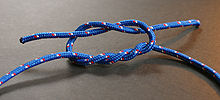The surgeon's knot is a surgical knot and is a simple modification to the reef knot. It adds an extra twist when tying the first throw, forming a double overhand knot. The additional turn provides more friction and can reduce loosening while the second half of the knot is tied.[1] This knot is commonly used by surgeons in situations where it is important to maintain tension on a suture, giving it its name.[2]
| Surgeon's knot | |
|---|---|
 The surgeon's knot before tightening showing the two twists in the bottom and the one on top | |
| Names | Surgeon's knot, Ligature knot |
| Category | Binding |
| Category 2 | Bend |
| Related | reef knot, Double overhand knot |
| ABoK | #461, #463, #1209 |
Surgeon's knots are also used in fly fishing, in tying quilts, and for tying knots with twine; it is particularly useful in tying raw meat with butcher's twine, as the wet meat creates similar risks of loosening as surgery. Some sources categorize the surgeon's knot as a bend, since it can be effective as such.[3]
Like the reef knot, the surgeon's knot capsizes and fails if one of the working ends is pulled away from the standing end closest to it.[citation needed]
Additional image
edit-
A surgeon's knot tied in nylon rope and tightened
-
Diagram of a surgeon's knot
-
Diagram of a reef knot
See also
editReferences
edit- ^ Day, Cyrus Lawrence (1986). The Art of Knotting and Splicing (4th ed.). Annapolis: Naval Institute Press. p. 42. ISBN 978-0870210624.
- ^ Ashley, Clifford W. (1944). The Ashley Book of Knots. New York: Doubleday. p. 75. ISBN 978-0385040259.
- ^ Budworth, Geoffrey (1999). The Ultimate Encyclopedia of Knots. London: Hermes House. p. 54. ISBN 9781859679111.